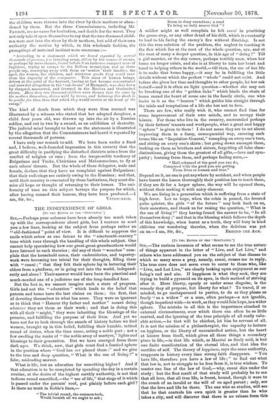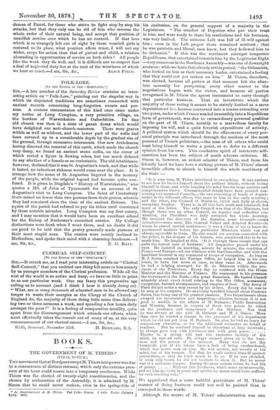[TO THE EDITOR OF THE"SPECTATOR:']
SIR,—The curious inversion of what seems to me the true nature• of things apparent in the letter of " Live, and Let Live," and others who have addressed you on the subject of that disease to• which so many seem a prey, namely, ennui, rouses me to reply.. The true cure does not seem even to occur to those who, like "Live, and Let Live," are clearly looking upon enjoyment as our being's end and aim. If happiness is what they seek, they are- trying to build a pyramid on its apex, in their method of striving after it. More liberty, openly or under some disguise, is the remedy they all propose, but liberty for what? To travel, if so. minded, to go unchaperoned to parties, to do as they please as- freely " as a widow " or a man, often perhaps—a not ignoble,. though impatient wish—to work, as they would fain hope, in a wider sphere. The mistake in all this is the importance attached to external circumstances, over which there can often be so little• control, and the ignoring of the true principle of all really valu- able action,—he that will be chiefest, let him be servant of all.. It is not the mission of a philanthropist, the capacity to lecture on hygiene, or the liberty of uncontrolled action, but the heart at leisure from itself, which gives all these things a secondary place in life,—in that life which, as Mazzini so finely said, is but one finite manifestation of the eternal idea, and that idea the sacrifice of self. The theory of happiness, says the same authority, reappears in history every time strong faith disappears. " You• have life, therefore you have a law of life ; " to find out what that law is, not to struggle to be free from it, is true wisdom. To• master one line of the law of God,—why, ennui dies under the study ; but the first result of that study will probably be to see that all love, that all true life, is freest, bound, though it were to• the couch of an invalid or the will of an aged parent ; only, see that the love and life be there. The one who so studies, will see that he that controls his own spirit is greater than he who- takes a city, and will discover that there is no release from this
demon of Ennui, for those who strive to fight step by step his attacks, but that they only can be rid of him who reverse the whole order of their natural being, and accept that position of unselfish service over which he has no controL If that love which is so strangely left out of sight by these wearied girls is restored to its place, what position offers truer, I will not say wider, scope for actioa than that of parent and child, a relation abounding in opportunities of service on both sides ? All people like the work they do well, and it is difficult not to suspect that a deal of neglected duty lies at the root of the weariness of which
we hear so much.—I am, Sir, &c., ALICE FIELD.



































 Previous page
Previous page